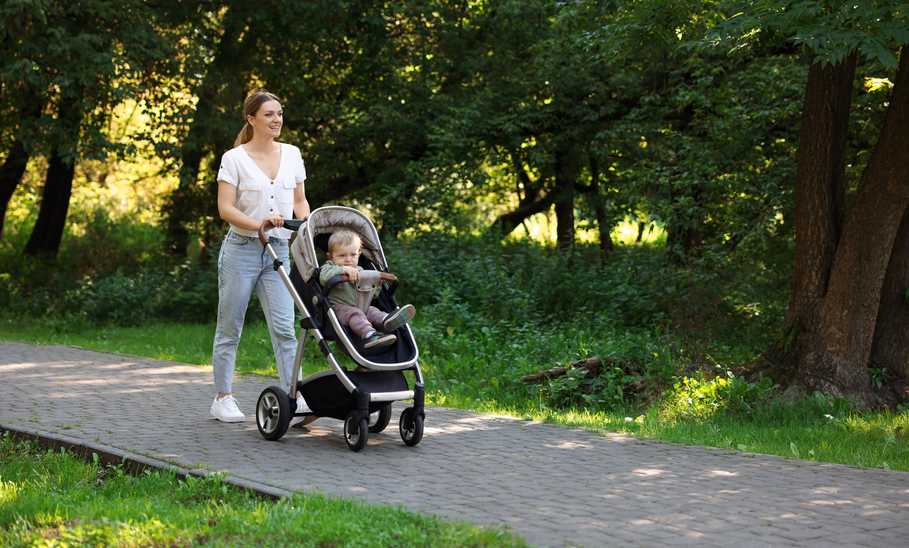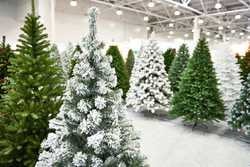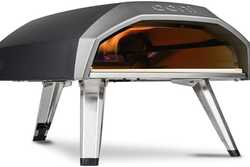How To Choose a Stroller for Your Child’s Safety and Comfort

Our evaluations and opinions are not influenced by our advertising relationships, but we may earn a commission from our partners’ links. This content is created by TIME Stamped, under TIME’s direction and produced in accordance with TIME’s editorial guidelines and overseen by TIME’s editorial staff. Learn more about it.
Choosing a stroller is one of the most important decisions you’ll make as a parent. That might sound overblown, but depending on how many children you have, you’re going to be pushing, folding, cleaning, and manhandling that thing for the next few years. As a dad of two kids less than two years apart, our stroller was where my babies spent a lot of their day (and did a whole bunch of messy snacking - and worse), and was the main conveyance for the endless amount of stuff that a day trip with two little ones entails.
Choosing the right stroller, then, takes a lot of consideration. How much space do you have? How many kids are you planning to put in it? How lightweight do you need it to be? How much travel are you planning on using it for? Which model is the safest and most comfortable for your baby, and the most convenient for you?
“Selecting the right stroller is important!” concurs Sarah Huff, gear expert and senior manager, customer and community, at BabyQuip. “Most parents really only need one stroller for their child(ren) and if you care for a stroller well, it will last you several years and through many children.”
“With so many brands on the market and a wide range of prices, choosing the right stroller can feel like a big decision,” says Jeff Mills, director at Baby & Co. “Although style is obviously an important factor, ease of use has to be the top priority—possessing the trendiest stroller on the block loses its allure if maneuverability becomes a daily chore.”
Mills recommends trying out the stroller first if possible, particularly folding and unfolding it and seeing how easily it fits into your trunk. “Simple things like, does the stroller have to be taken apart to fit in your vehicle, or can you fold it with the seat unit on, can become a make or break factor,” he says. “A stroller should last a few years until your little one is strong enough to walk most places, likely around three to four years of age, so choosing something that works well for you is vital.”
If you’ve already done a little research, you’ll know that there’s an almost overwhelming number of options to choose from, so whittling that number down is key to making your choice as stress-free as possible. “We recommend that new parents take a moment to consider how they'll be using their stroller,” says Mills. “Are you urban or rural parents? Do you use public transport? Is your home or car small? What’s your budget? All these factors can help to drastically reduce the number of options.”
It’s also well worth getting the opinion of trusted parent pals. “Seek advice from friends who already have children—they can offer valuable first hand experience and advice for new parents,” says Mills. “If you can get down to a shortlist of three or four, that would give you a good range to choose from.”
Part of your decision-making process should involve figuring out what you need from the stroller, as much as what your baby needs.
In my case, one consideration was simply the height of the handle–both my wife and I are over six feet tall, and the amount of back ache we’ve both experienced from low kitchen surfaces and the like made choosing a stroller with an extendable handle a no-brainer.
“Parents should take into consideration how much walking they do or how walkable their city is, what types of transportation they may take, and of course the weather in their location and how long their baby will be in a stroller during the day,” advises Huff.
“If you live in a city, finding a stroller with a compact fold must be a main consideration,” advises Mills. “Conversely, if you live in a more rural setting, larger wheels with good suspension will be more important than the folding mechanism.”
“You might also want to consider whether your family may grow in the future—there are several great stroller options that grow with your family by simply adding a second seat or bassinet,” says Mills.
If you plan on continuing your regular runs and jogs after you become a parent (good luck with that!) then consider a stroller designed for jogging, as running with a regular one will quickly stop being feasible.
The main stroller types are as follows:
These are your everyday, all-purpose strollers with four wheels, a comfortable seat, and storage compartments. “These are versatile, easy to maneuver, and suitable for everyday use such as walks in the park or shopping trips,” says Huff. “These strollers tend to offer a more compact fold and can easily be pushed with one hand,” adds Mills.
Generally used as travel strollers, these are lightweight and compact, with a simple folding mechanism somewhat resembling an umbrella. “These are perfect for quick errands due to their portability and easy storage in small spaces like car trunks or closets,” says Huff.
Typically, jogging strollers are three-wheeled with larger, air-filled tires (often around 18 inches) and a hand brake, as well as a suspension system for different terrains. “Usually the front wheel is fixed and doesn’t swivel,” says Mills. “Many of the higher specification joggers feature a coasting brake and adjustable tracking on the front wheel.”
Available in various configurations such as side-by-side or tandem, double strollers normally have either two seats, or one seat and a platform for an older child to stand on. “As the name suggests, these strollers carry two children,” says Mills. “This can either be twins or a toddler and a newborn. Some twin strollers are modular, allowing you to add or remove the additional seat unit or bassinet.”
These are versatile strollers that can be adapted to accommodate different configurations, such as converting from a single to a double stroller or accepting various infant car seats. “They grow with your family and adapt to changing needs without having to purchase multiple strollers, providing long-term value and convenience,” says Huff.
Which features you should consider in a stroller will ultimately come down to personal needs and preference, but a few features you might want to include are as follows:
If you want your baby to feel relaxed in your stroller (and you certainly will!) then you need them to feel safe and comfy. “The key features I look for in a stroller are a large, sun and wind blocking canopy, comfortable, full recline seats, and easy push,” says Huff.
Again, this is down to personal preference, but a car seat stroller combo is likely preferable for many parents. “If you’re choosing a stroller for a newborn then finding one that is car seat-compatible will be an advantage,” says Mills. “But be aware that not all infant carriers will be approved on all strollers. With the use of car seat adaptors, an infant carrier can be attached to the chassis of the stroller, but we suggest checking with the stroller manufacturer to find a list of approved and tested infant carriers.”
“Shopping basket size is always something customers feel is an important feature,” says Mills. “However, it’s worth noting that most manufactures have limited weight that the basket can support. Really, the basket is for carrying some stroller accessories like a rain cover and car seat adaptors, rather than heavy groceries.”
Since you’re probably going to be hauling the stroller into and out of your trunk (and maybe even up multiple flights of stairs, depending where you live), getting one you can manage without too much difficulty is absolutely vital. That kiddo is going to do enough damage to your body (so much neck and back ache!) without the stroller contributing.
“If you think you may want to use the stroller for multiple children, a stroller with different seating configurations is definitely the way to go,” says Huff. “Being able to turn a stroller from single to double easily is convenient and money saving.”
“I would also consider how easy the stroller is to operate or set up,” says Huff. “Strollers with complicated folding mechanisms or difficult set-ups when used daily are a hassle.”
Safety is the number one priority for most parents, so let’s ensure your stroller is as safe as it can possibly be.
“When it comes to selecting a stroller, we suggest purchasing one that's JPMA certified,” says Lisa Trofe, executive director of the Juvenile Products Manufacturers Association (JPMA). “Our certification program tests more than 2,500 products annually across 29 different categories, to ensure products meet the highest standards for performance and safety. One of those categories is carriages/strollers. The JPMA certification seal signifies that the product has been tested to the most stringent standards at an independent, Consumer Product Safety Commission (CPSC)-accredited laboratory. JPMA certified products are tested annually to the most recent standards for even more assurance.”
To easily find which strollers have this certification, you can view a list of manufacturers that offer JPMA certified strollers on this page of the JPMA site.
“In addition to selecting a safe stroller that fits with your lifestyle, JPMA recommends practicing safety when setting up and using a stroller,” says Trofe. She recommends keeping the following in mind:
“If you’re considering purchasing a secondhand stroller, do a search to see if the product has been recalled,” says Trofe. “You can search for recalls on the Consumer Product Safety Commission’s website. If you’re planning to re-use a product used for a previous baby, again, be sure to confirm that the product hasn’t been recalled—remember that safety standards improve over the years, so a stroller from more than ten years ago is not as safe as a new one.”
Keeping your stroller clean and in good shape is a daily battle, so consider the following advice.
“Store strollers in a clean and dry area, away from the sun,” says Huff. “Make sure to store strollers fully dry to prevent mold–if you frequently vacuum out Cheerios and wipe down the seats, the fabric will hold up much longer. Getting your stroller professionally cleaned before storing it for long periods will help it last in between kids!”
“Strollers with removable and washable seat covers are great and make them easy to care for,” says Huff. “I’d also try to choose a stroller in a darker color that won’t show sticky hand prints as easily.”
“It's important to remember that a stroller is a mechanical device and may require lubrication periodically, especially if it's used in dusty or muddy conditions,” warns Mills. “If you take your stroller to the beach, it's advisable to remove the wheels, clean them thoroughly, lubricate them, and then reattach them, as sand can cause significant wear on wheel mechanisms. Quick release wheels are a great feature to not only make cleaning easier, but also by removing the dirty wheels, you can keep your trunk dirt-free.”
Using a detachable seat liner can save a lot of time should there be any accidents. “These accessories are typically easy to remove and can be washed in a washing machine,” says Mills. “However, the seat fabrics are often not as easily removable, so spot cleaning is usually the better option.”
“Strollers are well designed these days, so the main safety issues would be caused by overloading the stroller, either with additional children standing on parts they shouldn’t be, or generally not using the product for the purpose it was intended for,” says Mills. He adds that it’s important to read your stroller’s instruction manual to get a better idea of what it can and can’t do.
“The main issue we see with strollers is hanging heavy items or diaper bags on the handle,” says Mills. “This can not only cause wear on the stroller folding joints, but also will cause the stroller to tip. We suggest carrying any items in a diaper bag on your shoulder or the popular backpack-style bags.”
“Strollers should have a five-point harness to keep little ones safely strapped in,” says Huff. It’s vital that you use this every time your kid is in the stroller, even if it’s just for going around the corner.

“The UPPAbaby Vista is very popular with our customers, combining great multi-terrain capabilities with luxurious styling,” says Mills. “The large wheels and active suspension means it’s very at home in parks but equally agile in the cities. The Vista is compatible with a number of baby car seats, with the added bonus of being able to add an additional seat or bassinet for future additions to the family.”
Speaking from personal experience, the UPPAbaby Vista was an absolute life-saver. Both my kids loved the bassinet as tiny ones, and later continued to enjoy stroller life in the fully reclined seat or rumble seat. It handled east coast snow and west coast desert, hauled everything we needed for a full day on the beach, and was a cinch to fold and unfold.

“My favorite stroller is the Duallie BOB jogging stroller,” says Huff. “It’s great for theme parks, walks, runs, and hikes, and it maneuvers well.” As well as the jogging stroller, BOB features a range of single strollers, travel systems, and wagons.

“Bugaboo has a wide range of strollers to offer parents the right solution for their needs, from the multi-terrain Fox 5 to the urban friendly Dragonfly,” says Mills. “Whichever model you choose from the Bugaboo range, you can be assured of quality, and with the addition of recycled fabrics and bio-based plastics, Bugaboo’s environmental credentials lead the industry.”
While there are some universal considerations for strollers—comfort, safety, and ease of use, e.g.—ultimately, the deciding factors are going to be about your lifestyle, rather than your baby’s. Figuring out how much space you have, how much you can easily lift, how much access you have to laundry, where you live, and how active you are will all play a part. You’re going to be relying on that stroller for years to come, so be sure you’re getting one that’s right for you!
The information presented here is created by TIME Stamped and overseen by TIME editorial staff. To learn more, see our About Us page.



